'Zero-Covid' or living with the virus: Does Hong Kong know what it wants?
Hong Kong is facing its toughest Covid-19 test yet with Covid-19 variants proving tricky and daily cases going into the thousands. Some panicked Hong Kongers have taken flight to the mainland to avoid catching the disease. Others are questioning the "dynamic zero-Covid" policy, asking why Hong Kong can't "live with the virus" as countries like Singapore are doing.
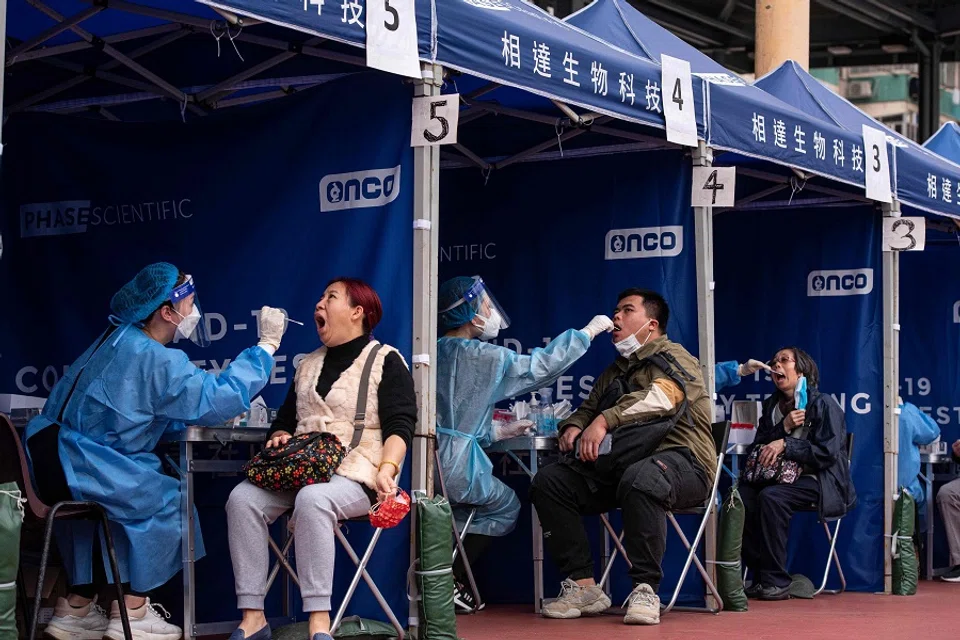
Hong Kong's Covid-19 situation worsened after the Chinese New Year and is on the verge of spinning out of control. Hong Kongers have been in a state of panic, with some even taking cover in the mainland.
28-year-old media professional Mr Wong is a resident of Mei Tin Estate in Tai Wai. Several Covid-19 variant cases were detected in the estate on 3 February and wastewater samples also tested positive for the coronavirus. This sparked concerns that there were "hidden patients" in the community. The Hong Kong government proceeded to lock down the estate and implement compulsory testing. The strict restrictions were only lifted a few days ago.
Wong told Zaobao on 9 February that other Covid-19 cases were discovered during the lockdown, but an estate management staff said that some of them were not taken to the hospital but asked to self-quarantine because of a lack of hospital beds.
Wong was very angry about this and thought that the authorities started strong but ended with a whimper. He complained, "If infected patients lack discipline and leave their houses, it would be easy for the virus to spread in the estate again."
There are several signs that this wave of Covid-19 infections is wreaking unprecedented havoc in Hong Konger's lives.
30% of cross-border truck drivers in quarantine in the mainland
Actually, to enhance contact tracing efforts, Hong Kong's Centre for Health Protection has been requesting non-symptomatic close contacts of Covid-19 patients to be quarantined at the Penny's Bay quarantine centre.
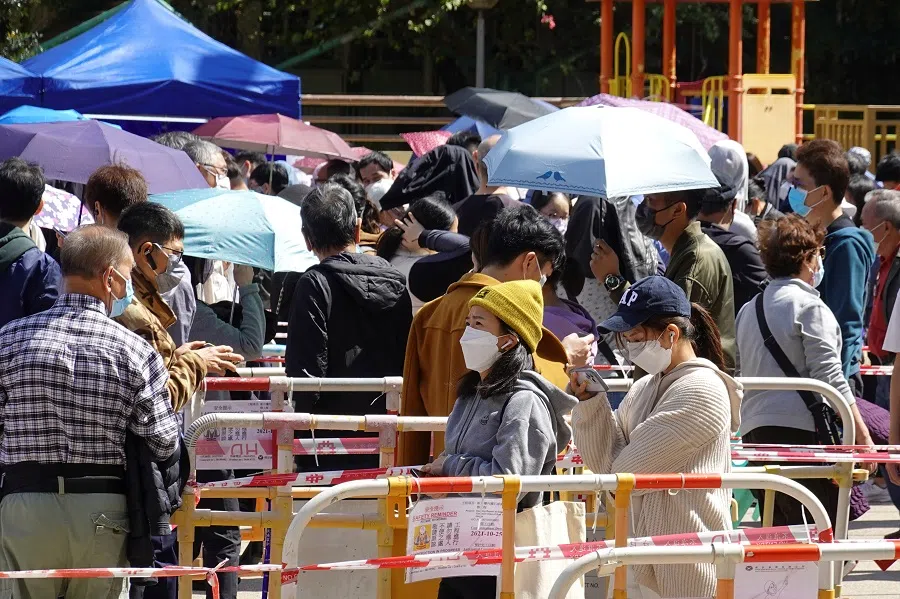
But with the recent spike in Covid-19 cases, hospital beds are running out. The Hong Kong government recently launched the "StayHomeSafe" Scheme under which the Penny's Bay quarantine centre would be converted into a community isolation facility for infected persons exhibiting mild or no symptoms, and close contacts of Covid-19 patients would be directed to undergo home quarantine. Should there be no more beds at the hospitals or quarantine centres, it is also possible that patients would be asked to self-isolate at home. But this move has raised concerns about the further spread of the coronavirus in the community.
There are several signs that this wave of Covid-19 infections is wreaking unprecedented havoc in Hong Konger's lives. For instance, with more cross-border truck drivers testing positive for Covid-19, the transportation of goods has been disrupted, leading to fresh food shortages in Hong Kong. As prices soar, vegetables at grocery stores and supermarkets are being snapped up.
The Democratic Alliance for the Betterment and Progress of Hong Kong (DAB), Hong Kong's largest pro-establishment political party, estimated on 9 February that 30% of the approximately 300 cross-border truck drivers responsible for transporting vegetables are currently being quarantined in the mainland, adding that the price mark-up of vegetables is expected to continue. Lawmaker Steven Ho, DAB member representing the agriculture and fisheries sector, pointed out that roughly 15% of truck drivers have quit their jobs amid the pandemic. If the situation gets worse, Hong Kong's fresh food supply may be affected.
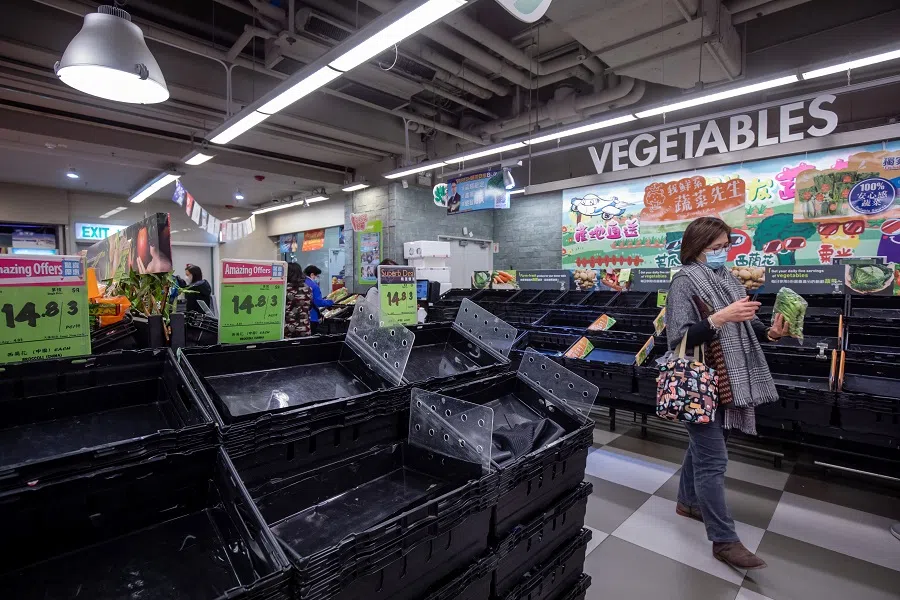
Data shows that Hong Kong was hit by a fifth wave of Covid-19 infections in late December last year. It even experienced a sudden surge in case numbers recently, breaching a new threshold with about 2,000 suspected Covid-19 cases, along with more than 1,340 confirmed infections on 13 February. Assistant Professor Sean Yuan Hsiang-yu of City University of Hong Kong's Department of Biomedical Sciences believes that the number of Covid-19 cases could increase exponentially and reach between 100,000 to 200,000 cases.
Zaobao understands that among those returning to mainland China to avoid the pandemic are unemployed Hong Kongers and migrant workers living in Hong Kong, as well as quite a number of students from mainland China...
Faced with the rapid spread of the pandemic, Hong Kong is in a state of panic and many people are heading to the mainland to escape from the pandemic. At the time of writing, designated "health stations" or quarantine hotels in Shenzhen are fully booked until the end of the month.
Figures from the Hong Kong Immigration Department show that 946 people left Hong Kong via Shenzhen Bay on 1 February; on 8 February, that number had increased to 2,170 people. Health stations in Shenzhen can accommodate up to 2,000 online applicants daily for their quarantine rooms.
On 9 February, the Shenzhen People's Government Port Office released a reminder for incoming travellers to follow the rules in booking quarantine rooms at the health stations, and to protect themselves and manage their health.
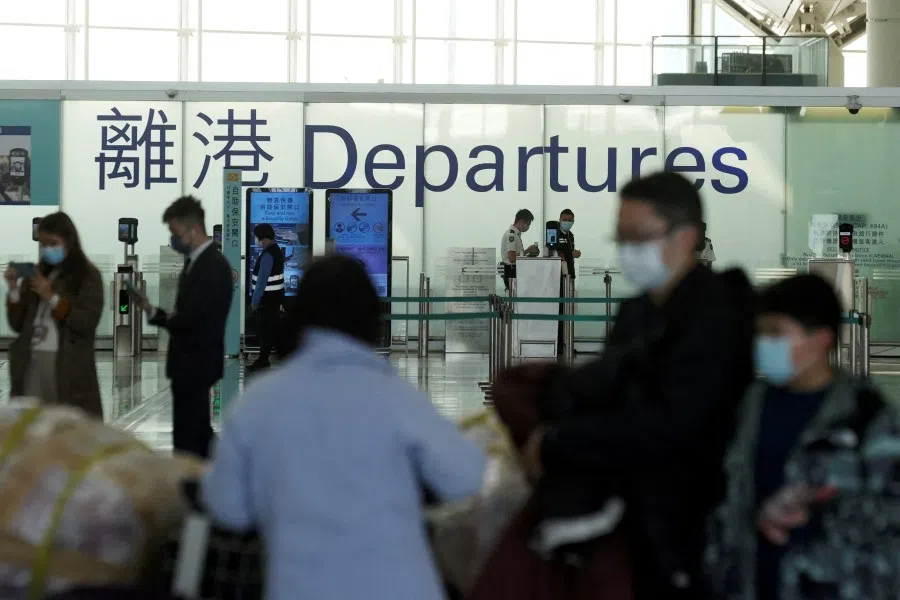
Zaobao understands that among those returning to mainland China to avoid the pandemic are unemployed Hong Kongers and migrant workers living in Hong Kong, as well as quite a number of students from mainland China, many of whom have chosen to go back to mainland China for their studies, since Hong Kong universities have announced online lessons.
One of them is Lu Yang, who arrived in Hong Kong in September last year for his university studies and flew back to Shanghai on 11 February. Speaking to Zaobao on 9 February, he said Hong Kongers were previously allowed to return to mainland China via Shenzhen without booking a quarantine hotel, but this is no longer possible of late, and so he can only take a flight. "Now, even the flights are full," he said. "Yesterday, I managed to book an air ticket for a friend, but seats are only available after 20 February."
They doubt that zero-Covid is attainable and are calling on the Hong Kong government to emulate Singapore's strategy of living with the virus.
People complaining and objecting that zero-Covid is unattainable
Lu criticised the Hong Kong government for being passive in its pandemic efforts and not effectively controlling the outbreak. Hong Kongers are also starting to show pandemic fatigue, where people are sometimes seen smoking or chatting maskless on the street.
The fact is, Hong Kong's strict social distancing measures are prompting more and more people to complain that their normal daily life is being disrupted. They doubt that zero-Covid is attainable and are calling on the Hong Kong government to emulate Singapore's strategy of living with the virus. A survey released last month by the Hong Kong Democratic Party shows that 65% of respondents "should" or "definitely should" adopt the strategy of living with the virus.
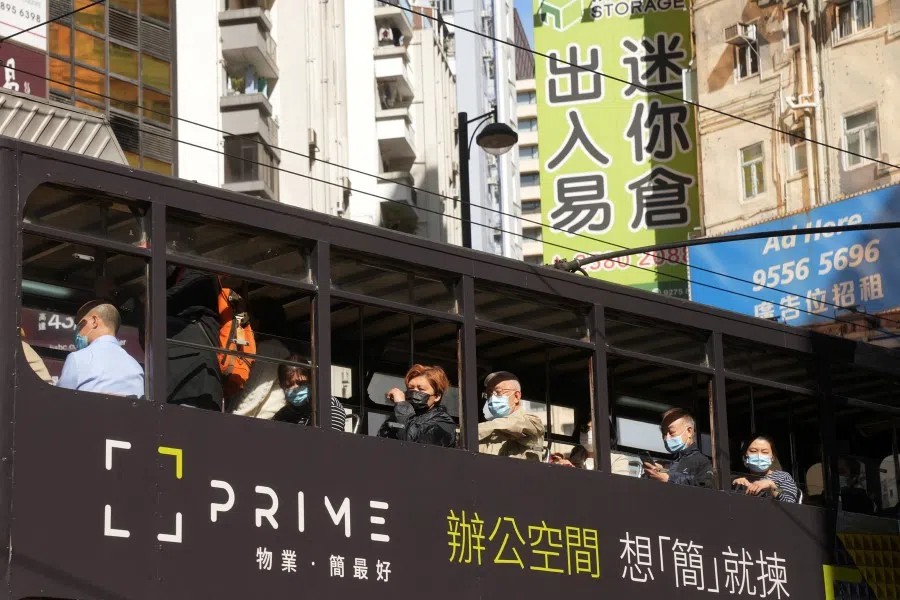
However, Professor Liang Wannian, an epidemiologist who heads China's team of National Health Commission experts on coronavirus prevention, feels that China's efforts have proven that the "dynamic zero-Covid" strategy is realistic and applicable to Hong Kong, and zero-Covid is possible if people are willing to cooperate.
He proposed a "streamed" approach in handling the current wave, channelling resources to where they are most needed, and ramping up tests or conducting repeated tests in locations where there are possible superspreader events. He encouraged people to conduct rapid tests, and to report positive tests and self-quarantine.
James Sung Lap-kung, director of the Hong Kong Progress and Perfection Research Institute, told Zaobao that the key to Hong Kong's pandemic efforts is whether it can successfully break the chain of infection, which depends on the coordination and implementation capabilities of government departments. He said: "This is the largest-scale mobilisation in Hong Kong's 170-year history, and the biggest test of governance."


![[Big read] When the Arctic opens, what happens to Singapore?](https://cassette.sphdigital.com.sg/image/thinkchina/da65edebca34645c711c55e83e9877109b3c53847ebb1305573974651df1d13a)


![[Video] George Yeo: America’s deep pain — and why China won’t colonise](https://cassette.sphdigital.com.sg/image/thinkchina/15083e45d96c12390bdea6af2daf19fd9fcd875aa44a0f92796f34e3dad561cc)